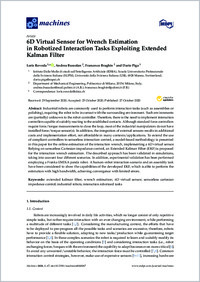6D virtual sensor for wrench estimation in robotized interaction tasks exploiting extended Kalman filter
- Roveda, Loris Istituto Dalle Molle di studi sull'intelligenza artificiale (IDSIA), Facoltà di scienze informatiche, Università della Svizzera italiana, Svizzera
- Bussolan, Andrea Department of Mechanical Engineering, Politecnico di Milano, 20156 Milano, Italy
- Braghin, Francesco Department of Mechanical Engineering, Politecnico di Milano, 20156 Milano, Italy
- Piga, Dario Istituto Dalle Molle di studi sull'intelligenza artificiale (IDSIA), Facoltà di scienze informatiche, Università della Svizzera italiana, Svizzera
-
2020
Published in:
- Machines. - MDPI. - 2020, vol. 8, no. 4, p. 17
Extended kalman filter
Wrench estimation
6D virtual sensor
Sensorless cartesian impedance control
Industrial robots
Interaction robotized tasks
English
Industrial robots are commonly used to perform interaction tasks (such as assemblies or polishing), requiring the robot to be in contact with the surrounding environment. Such environments are (partially) unknown to the robot controller. Therefore, there is the need to implement interaction controllers capable of suitably reacting to the established contacts. Although standard force controllers require force/torque measurements to close the loop, most of the industrial manipulators do not have installed force/torque sensor(s). In addition, the integration of external sensors results in additional costs and implementation effort, not affordable in many contexts/applications. To extend the use of compliant controllers to sensorless interaction control, a model-based methodology is presented in this paper for the online estimation of the interaction wrench, implementing a 6D virtual sensor. Relying on sensorless Cartesian impedance control, an Extended Kalman Filter (EKF) is proposed for the interaction wrench estimation. The described approach has been validated in simulations, taking into account four different scenarios. In addition, experimental validation has been performed employing a Franka EMIKA panda robot. A human–robot interaction scenario and an assembly task have been considered to show the capabilities of the developed EKF, which is able to perform the estimation with high bandwidth, achieving convergence with limited errors.
- Language
-
- English
- Classification
- Computer science and technology
- License
- Open access status
- gold
- Identifiers
-
- RERO DOC 333621
- DOI 10.3390/machines8040067
- ARK ark:/12658/srd1319395
- Persistent URL
- https://n2t.net/ark:/12658/srd1319395
Statistics
Document views: 253
File downloads:
- Texte intégral: 191
